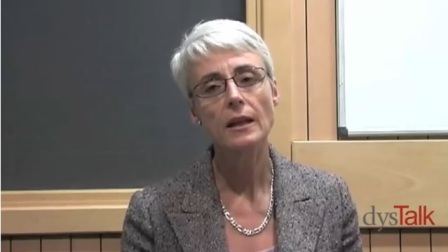Dyslexia support and intervention
3 Replies
UK reading expert Professor Maggie Snowling has an excellent 5-minute talk on YouTube about how to help children with dyslexia – not always a term used in Australia, but this talk is relevant to any child who is at risk or struggling to learn reading and spelling for no obvious reason.
Here's a quick summary of the video, but feel free to skip it and just watch the video below:
- In the preschool years children with oral language difficulties should receive early intervention from a Speech and Language Therapist (in Australia called Speech Pathologists – click here to find one, or if you're outside Australia, see this page).
- In preschool it's also wise to teach children about letters and the sounds they represent, just one or two letters at a time, to tune them into the notion that letters and sounds are related.
- Once they start school, parents should be aware of how their child is going relative to other children, and because systematic Synthetic Phonics is now mandatory in the early years of primary school in the UK, teachers should also be very aware of who's not catching on to sounds and letters. In Australia most early years classrooms aren't yet using systematic Synthetic Phonics, but most early years teachers can still tell you who in their classes is struggling by about the middle of the first year of school.
- Schools should have an action plan for quickly helping children who are not catching on to sounds and letter, firstly working in small groups, using one of the many catch-up programs now available.
- If children are then still struggling, the school should provide them with individualised help.
- Prof. Snowling says parents should not be doing all the remedial work themselves, as they have a vital parenting role, supporting their child emotionally, building their strengths and praising them for their abilities. Parents should be supporting literacy intervention but not taking on the role of teacher.
- She highlights the importance of not mixing up reading for pleasure (reading to children) and reading for instruction (children reading themselves), so that children who are struggling still have access to quality literature, narrative structure, vocabulary, discussion of stories etc and to fuel their creativity, while still building their decoding skills to the point where they can read these stories independently one day.



V. good summary, Alison .I understand Margaret Snowling's point parents should not be doing all the remedial work themselves certainly not ALL! But when a reading programme is really well researched and designed, it's hugely satisfying to help. The little BRI boy on the video you highlighted shows what a lovely shared experience it can be – and when a programme of fun stories is meticulously structured and progresses with enough help for struggling readers, then it's very rewarding.
'She highlights the importance of not mixing up reading for pleasure (reading to children) and reading for instruction' This is normally very true. It's horrible to see a story interrupted by technical aspects being pointed out. But BRI manages to do both – I think it's fairly unique in this respect.
Lots of really great tips and suggestions here…
And while I agree that parents should not take on all the remedial work themsevles, it seems that often there is no choice. I have a friend who's 6 year old is struggling and a school who just doesn't have the resources (and soon to have even less when the reading recovery teacher retires) to do much extra and a system where the waiting list for even basic speech is 6 months or more. As a parent I know I'd rather step up to teach than sit and wait doing nothing.
Yes, professors need to talk about what should happen, and I guess it’s up to all of us who know and care about this to make it happen, but until it does, parents don’t have much of a choice, especially if they can’t afford private services. Good luck to your friend and if she wants me to send her a free pdf copy of my first workbook (which seems to be easy enough for parents to use and to often get kids who are stuck moving) and some games, please just tell her to get in touch. Also I just went down to the public library near the school I was working at today and asked them to buy some of the UK Phonic Books to lend out, and they said YES! So when they do, the kids on my caseload who need these sorts of books, but whose families can’t afford their own copies, can get them from there, if all the school library ones are out. She might like to try that at her local public library?